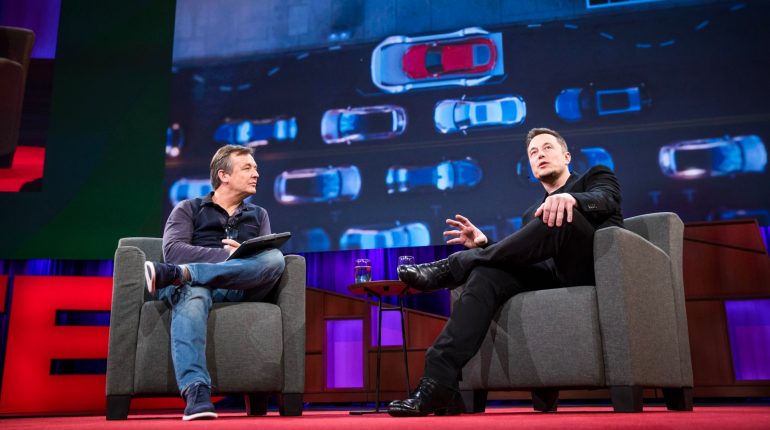Tesla founder Elon Musk does not want to imagine a future where humans don’t reach beyond our planet and cars don’t drive on their own.
In a Q&A with TED’s head curator Chris Anderson at the TED 2017 conference in Vancouver, Musk talked about what the future will look like as he shared details about his newest venture, The Boring Company; the latest from Tesla and SpaceX, and his motivation for building a future on Mars.
Musk said The Boring Company’s mission is to build a 3D underground tunnel for cars, to help alleviate traffic.
“One of the most soul-destroying things is traffic,” said Musk. “It affects people in every part of the world. It takes away so much of your life. It’s horrible.”
By end of this year, a Tesla car will be able to drive across the US autonomously, says Elon Musk. #TED2017
— Tim Leberecht (@timleberecht) April 28, 2017
Musk’s vision to ease traffic would involve sending cars underground, where they would travel from Point A to Point B through tunnels on a platform called “skate” at high speeds up to 200 kilometres per hour. Musk said these tunnel networks would be built at deep levels underground and help reduce traffic congestion.
“I’m not trying to be anyone’s saviour. I’m just trying to think about the future and not be sad.”
“There’s no real limit to how many levels of tunnels you can have. You can go much further deep…you can alleviate any arbitrary level of open congestion with a 3D tunnel network,” said Musk, adding that the tunnels wouldn’t disrupt people’s lives even if they were built under homes and offices. “If that tunnel is dug more than three or four tunnel diameters beneath your house, you will not be able to detect it being dug.”
While Musk addressed what The Boring Company is trying to build, he didn’t disclose any specific details about the company’s progress in tunneling, as the project is run by interns and part-time workers, and consumes only about two or three percent of Musk’s time.
In his talk, Musk also shared the latest updates on Tesla and SpaceX, revealing that by the end of 2017, a fully autonomous, self-driving car will be able to go from “a parking lot in California to a parking lot in New York,” with “no controls touched at any point during the journey.” Musk said that these self-driving cars will not be limited to travelling between just Los Angeles and New York, but also extend to other cities like Seattle, Florida, and Toronto.
https://twitter.com/LanceMSanderson/status/858804541906726913
When asked about the impact of self-driving cars on people who use them, Musk said that cars will create a window for “shared autonomy,” where people can share their cars with friends and family or even earn a little money by letting the car perform Uber-like services.
“It’s important to have something that makes you want to get up in the morning and want to live.”
“There will be a shared autonomy fleet where you buy your car and you can choose to use that care exclusively,” said Musk. “You could choose to have it used only by friends and family…[or] only by other drivers who are rated five-star. You can choose to share it sometimes but not other times. That’s 100 percent what will occur. It’s just a question of when.”
When it comes to creating technologies that change how people live, Musk’s ideas don’t end at self-driving cars. At TED 2017, Musk also spoke about how SpaceX is developing technology that can take people into space, and eventually to the surface of Mars.
“It’s important to have something that makes you want to get up in the morning and want to live,” said Musk. “And if the future does not include being out there in the stars and being a multiplanet species, I find that incredibly depressing.”
Anderson asked why Musk wants to create a 40-story rocket that can take humans to Mars, when he could simply focus on sustainable energy solutions like electric, self-driving cars that have an immediate impact on Earth.
Musk said it’s about making sure the world continues to have progress, and pointed out that even space travel hasn’t progressed much further since humans made it to the moon.
“If you look at the progress in space, in 1969 we were able to send somebody to the moon. Then we had the space shuttle, which could only take people to low-Earth orbit. Now we can take no one to orbit,” said Musk. “We’re mistaken when we think technology automatically improves. It only improves if a lot of people work very hard to make it better.”
While Musk’s companies will be at the forefront of world progress, he stresses that he doesn’t see himself as a “saviour.”
“I want to be clear,” said Musk. “I’m not trying to be anyone’s saviour. I’m just trying to think about the future and not be sad.”
Watch the full talk below:


